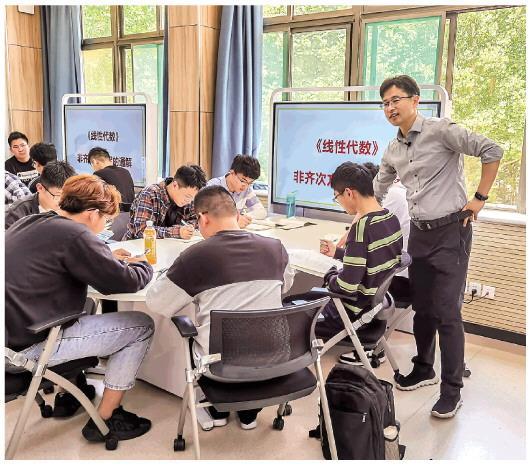Educational content gains wider popularity on video-sharing platforms
Bilibili, a Chinese video-sharing website known for its anime, comics, and gaming-centric content (ACG), currently hosts nearly one thousand teachers as original content creators, including nearly 300 college tutors, experts and scholars, with knowledge-based content watched via this platform accounting for 45 percent of the total.
Data from Douyin, China's version of TikTok, also attests to this trend -- the video playback volume of education-oriented content on its platform soared by 74 percent last year, with a total of 1.36 million comments saying things like "I have benefited from watching this video clip".

Song Hao, an asociate professor with the School of Mathematics and Quantitative Economics of Shandong University of Finance and Economics, gives a lecture to students. (Photo provided by Song Hao)
User interest in educational videos related to professional fields and practical knowledge rose by 21 percent and 16.7 percent respectively year on year, in spite of a slight drop in demand for entertainment-based content, according to the 2020 China Mobile Internet Report.
A recent report released by Douyin also indicated that 1,259 domestic colleges and universities have registered their official accounts on this platform. Among them, the accounts of Tsinghua University, Peking University, and National University of Defense Technology have the most followers.
The popularity of educational videos can also be reflected in the fact that the total number of followers for top-level academic experts on Bilibili exceeded 55 million. Luo Xiang, one of the content curators and also a professor with the China University of Political Science and Law, is followed by 18.78 million online users.
This rise in popularity of educational video resources can partly be attributed to the outbreak of COVID-19. For instance, Zhao Bin, a professor with Fudan University, started uploading his video lessons pre-recorded on Bilibili for the first time last year when his students had to study remotely due to the pandemic.
Zhao noted that compared with traditional websites which offer online courses, Bilibili is as a more favorable platform for him to give lectures on, since it can support a larger number of users viewing the same video clip simultaneously. "Many students who attend my video lessons out of their own interest say that it is a fruitful experience for them," said Zhao, beaming with pride.
Similarly, Song Hao, an associate professor with the School of Mathematics and Quantitative Economics of Shandong University of Finance and Economics, started to upload educational content even earlier, about eight years ago. Initially intending to offer convenience to his own students, his channel has been subscribed by 2.46 million platform users.
“I want to set up China's Khan Academy, allowing every Chinese student, whether in elementary school or university, to learn maths by video," Song said.
Educational videos that impart knowledge in this unique form are of great benefit for viewers. "Although I fail to meet the threshold for admission into Fudan University, I am still a student of professors from this school," and similar comments are often posted on Bilibili.
In turn, positive feedback from the viewers also gives inspiration to those educational content creators. Zhao mentioned that his followers often remind him to upload new episodes, while another content creator, Cai Danjun, an associate professor at the School of Arts at Renmin University of China, said that she enjoyed reading the bullet screens and comments of her videos, and often finds time to reply to private messages.
This new form of interaction between instructors and learners has created a welcoming and engaging learning environment, positively contributing to equal access to knowledge among online users. "Online users have different identities in real life, and it is important for educators to make no social distinctions in teaching," said Cai.
Photos
Related Stories
- Dream chaser: dancers and musicians redefining what it means to be disabled
- China is entering an "era of video socialization": report
- People’s Daily Online seeks short video content for “Our China stories”
- Aerial footage of the bridge with world's highest pier , Longtanhe River Grand Bridge
- Paid subscribers to exceed 100 million for two leading Chinese online video platforms
Copyright © 2021 People's Daily Online. All Rights Reserved.










